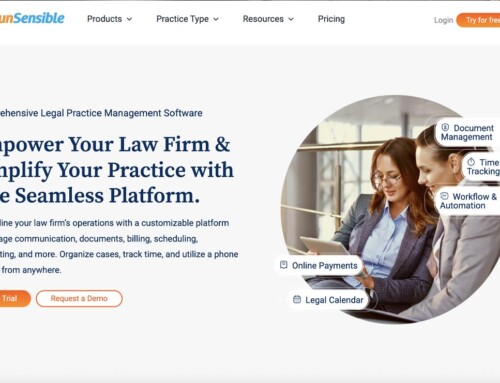Contents
The legal industry’s approach to marketing has entered a new era. With digital channels now central to how clients find and choose legal services, successful firms must treat online marketing as an evolving, strategic function, not a one-time initiative. While word-of-mouth referrals and traditional networking still hold value, they no longer suffice in a landscape where prospective clients turn first to the internet for legal representation. A strong online marketing strategy for law firms is essential for survival and growth.
This article delivers actionable online marketing tips and best practices for law firms, with strategies tailored specifically to the unique dynamics of the legal profession. Whether you’re a solo attorney, a boutique practice, or a growing mid-sized firm, you’ll find proven methods to:
- Strengthen your online presence
- Improve your discoverability on search engines
- Build credibility through valuable content and reviews
- Target ideal clients using data-driven tools
- Maintain ethical compliance while marketing effectively
From foundational tactics like website optimization and local SEO to advanced tools like marketing automation and AI-enhanced audience targeting, we’ll guide you through each law firm marketing element in today’s digital-first world.
Foundational Elements: Your Digital Storefront
A well-structured, high-performing website anchors any serious effort in online marketing for law firms. In a market where clients evaluate legal services through digital touchpoints, your website must present a clear, trustworthy, and accessible experience from the first click.
Legal consumers today expect fast-loading pages, easy navigation, and content that addresses their needs immediately. A firm’s ability to meet those expectations determines the number of leads generated and lost.
A. Strategic Architecture That Builds Trust
Site architecture is critical in shaping how users engage with your content. Visitors should be able to move through the site naturally, finding information without confusion or dead ends. Each page must serve a clear purpose within an organized structure. Key Elements of Effective Legal Website Architecture:
- Defined practice area pages with consistent formatting and clear language
- Accordion menus and expandable sections for handling dense legal topics
- Internal links that guide users toward related services or educational content
- Interactive tools such as case valuation calculators or jurisdiction maps
This strategic layout supports both usability and SEO, making your website easier for clients to navigate and easier for search engines to index.
B. Technical Performance Standards for 2025
Site performance influences everything from bounce rates to lead conversions. Research data shows that 73% of users leave a website if it takes longer than 2.8 seconds to load. Performance Best Practices:
- Compress images and use next-gen formats (e.g., WebP)
- Minimize HTTP requests and enable server-side caching
- Integrate a content delivery network (CDN) for global speed consistency
- Use Progressive Web App (PWA) technology for mobile efficiency
Proper mobile responsiveness involves more than resizing content. Law firm websites need layouts and touch interactions explicitly designed for smartphones and tablets. Features like click-to-call buttons and dynamic content based on geolocation help local firms connect with relevant users immediately. Security signals matter to both search engines and clients. Use:
- Extended Validation (EV) SSL certificates with visible trust indicators
- Regular security audits and Web Application Firewalls (WAFs)
- Updated privacy policies and secure client intake forms
Clients often decide whether to trust your firm within the first few seconds. A fast, secure, professional site gives them every reason to stay.
C. Content That Supports Client Decisions
Content remains one of the most potent tools in law firm marketing. Effective websites provide helpful, relevant content that answers client questions, clarifies practice areas, and reinforces your firm’s authority. Core Content Features:
- Attorney bios enhanced with short video introductions and structured data
- Practice area pages tailored to specific legal issues and client concerns
- Educational blog posts, FAQs, and downloadable guides
- Verified testimonials and case summaries (with appropriate disclaimers)
Interactive elements like quizzes or legal checklists add utility while boosting engagement. These features also increase the time users spend on your site, a key indicator of content value.
D. Conversion Design: Turning Visitors into Leads
Every element of your site should help drive inquiries. Whether it’s a form, a phone number, or a chatbot, the goal is to reduce friction and guide users to act. Effective Conversion Features:
- Persistent CTAs that remain visible during scrolling
- AI-powered chatbots that qualify leads and book consultations
- Multi-step lead forms that adapt based on user behavior
- Click-to-call buttons and one-click scheduling for convenience
Regularly test each conversion path for performance and refine it to reduce drop-offs. A strong call to action and an exemplary user interface can significantly increase the volume of quality leads.
E. Accessibility and Inclusivity in Legal Web Design
Compliance with accessibility standards is not optional. Updated ADA interpretations make web accessibility a legal responsibility and improve usability for all visitors.
Accessibility Essentials:
- Screen-reader compatibility using ARIA landmarks
- High-contrast design and adjustable font sizes
- Closed captions for videos and transcripts for podcasts or webinars
- Keyboard navigation support for users with mobility impairments
These improvements help expand your client base and reduce legal exposure, especially for firms serving broad or diverse communities.
Getting Found: Search Engine Optimization (SEO)
In an era when nearly all legal inquiries begin online, visibility in search results directly impacts your firm’s ability to attract and retain clients. Law firm SEO in 2025 demands a strategic blend of technical optimization, local targeting, and valuable content, all tailored to meet the needs of a digitally empowered client base. Law firms must implement precise and adaptive SEO strategies to maintain relevance as search behaviors evolve through AI tools, voice queries, and hyper-local algorithms.
While paid advertising provides short-term exposure, search engine optimization offers sustainable, long-term growth by connecting your firm with high-intent prospects who need legal assistance. For firms focused on growth, lead quality, and cost efficiency, investing in SEO is not just clever marketing; it’s essential for long-term competitiveness in today’s digital-first legal marketplace.
A. Why SEO is Non-Negotiable
Search Engine Optimization (SEO) has evolved from a mere competitive advantage into a fundamental business requirement. By 2025, 79% of law firms will use SEO for acquiring client. This trend is understandable, considering that 87% of potential clients now initiate their search for legal assistance through search engines or AI-powered assistants, rather than relying on traditional referrals.
The position of a firm in search rankings directly impacts its business outcomes. For instance, firms appearing on the first page of Google capture over half of all search traffic. In contrast, those listed beyond the third page receive minimal engagement. Furthermore, SEO offers superior cost-efficiency. Organic leads demonstrate a conversion rate of 14.6%, substantially higher than traditional outbound marketing efforts, which average only 1.7%. This conversion rate translates to acquiring higher-quality cases at a reduced cost per acquisition.
B. Keyword Research
Precise keyword targeting forms the foundation of effective SEO for law firms. Instead of concentrating on broad, highly competitive terms such as “divorce lawyer,” current strategies emphasize long-tail keywords. These keywords reflect user intent and location, including phrases like “divorce lawyer for business owners in Chicago” or “DUI attorney near Santa Monica.”
Firms can incorporate tools that analyze local search patterns and geofencing data to identify high-converting phrases specific to their markets. Voice search is also gaining importance as users increasingly ask natural language questions, such as, “Can I sue my employer for unpaid wages in Florida?” The most competitive firms ensure their keyword portfolios are updated quarterly. This regular review helps them stay aligned with evolving legislation, changes in search behavior, and shifts in client demand.
C. On-Page SEO
On-page SEO focuses on structuring your website effectively for user experience and search engine visibility. This practice involves aligning page titles, headers, and content with clear keyword themes while ensuring the material remains readable.
For example, a well-optimized title could be “Family Law Attorney in Houston | Custody, Divorce & Mediation.” Headers, ranging from H1 to H3, should accurately reflect the hierarchy of topics. This structure helps readers and search engines understand the organization of your content.
Image optimization has advanced significantly beyond merely adding alt text. Modern techniques include incorporating descriptive captions, schema markup, and location-based metadata, boosting performance in traditional and visual search results. It is also crucial that all media files are compressed to maintain fast loading speeds, as these speeds directly influence bounce rates and search rankings.
Content organization benefits from a hub-and-spoke model. In this approach, a comprehensive guide, such as one on estate planning, acts as the central hub. This hub links to articles covering wills, trusts, and probate procedures. This internal linking structure strengthens SEO and keeps users engaged with your content.
D. Local SEO
Local SEO empowers law firms to establish dominance in their immediate geographic markets. Optimizing your Google Business Profile (GBP) is a crucial step. This optimization ensures complete and accurate business details, clearly defined practice areas, specified service regions, and recent client-focused posts.
Firms that consistently appear in local legal directories, such as Avvo, Justia, and Super Lawyers, benefit from stronger credibility and improved ranking performance. It is essential to maintain accurate listings across more than 85 directories and ensure your name, address, and phone number (NAP) are identical everywhere.
Reviews play a significant role as a local ranking factor. Google favors firms with consistent, recent feedback and average ratings above 4.8 stars. Firms that proactively request reviews and respond to them professionally and ethically typically achieve better placement in local map results, accounting for over 40% of local search clicks.
E. Content Marketing for SEO
SEO and content marketing are intricately connected. Law firms that consistently publish timely and relevant content can achieve greater visibility, build client trust, and generate valuable backlinks.
In 2025, the most effective legal content will comprise in-depth guides, comprehensive FAQ pages, and informative video explainers. Each piece should be structured around actual client questions. For instance, a blog post, “What to Expect in a Child Custody Hearing in Texas,” enhances search rankings and is valuable for prospective clients evaluating your firm’s expertise.
Interactive features like legal checklists or case evaluation tools can significantly increase user engagement and dwell time. These are two critical metrics that search engines increasingly use to assess content quality. Attorneys can also repurpose client FAQs, legislative updates, or case studies into blog posts with AI-driven writing tools. This approach helps streamline content creation while ensuring adherence to ethical boundaries.
Regularly updated evergreen content libraries offer ongoing SEO value and assist in maintaining topical authority. By combining these foundational pieces with timely posts on legal news or changes in legislation, your firm can gain visibility across core and trending topics.
Building Authority and Engagement: Content & Social Media
In the current digital landscape, authority and trust are earned through visibility, consistency, and value. Content marketing and social media are no longer optional tools for law firms, and they’re core components of a successful online marketing strategy. These platforms allow legal professionals to demonstrate expertise, connect with potential clients, and position their firms as reliable thought leaders.
A. Content Marketing Strategy
Effective content marketing helps law firms attract qualified leads, build trust, and strengthen online visibility. It starts with clear goals and a strong understanding of your audience.
Begin by defining what you want your content to achieve, generating that SDS, increasing brand awareness, or establishing authority in a specific practice area. This clarity will guide the topics, tone, and formats you use.
Equally important is knowing your audience. What legal issues do they face? What questions are they asking online? Content that answers these questions, such as “What Happens During a DUI Hearing?” or “How to Choose a Business Structure,” positions your firm as helpful and credible.
Consistency is key. Use a content calendar to plan blog posts, guides, and FAQs around timely, relevant topics in your practice areas. Publishing regularly builds trust with both readers and search engines.
Above all, ensure your content is educational, not promotional. Avoid promising outcomes or giving case-specific advice. Include disclaimers where needed, and constantly review content for accuracy and ethical compliance.
B. Social Media Presence
Social media platforms are powerful amplifiers of your content and your brand. They provide a space to distribute educational material, engage with your community, and demonstrate your firm’s culture and values. According to recent reports, 71% of lawyers attribute at least some new client acquisition to their social media efforts, up from just 38% in 2020.
Choosing the right platforms depends on your target market:
- LinkedIn is ideal for B2B legal services, thought leadership, and professional networking. Law firms that regularly publish original insights and updates position themselves as credible authorities.
- Facebook is well-suited for community-focused firms in family law, personal injury, or estate planning. It supports local visibility, event promotion, and sharing client-friendly content in a more conversational tone.
- Instagram offers unique opportunities for visual storytelling, including team introductions, community involvement, infographics, and culture-focused content that helps humanize your brand.
Video is also a high-performing content type across platforms. Legal explainers, attorney introductions, and client process walkthroughs increase engagement and create a sense of familiarity and trust.
Platform-Specific Strategies and Best Practices
Each social media channel serves a distinct role in law firm marketing and requires tailored strategies:
Firms should maintain a complete, well-branded company page and encourage attorneys to be active on personal profiles. Content should center on legal insights, firm news, and professional commentary. Participation in relevant groups, thoughtful responses to industry posts, and regularly publishing original content effectively boost visibility and referral potential.
Though underutilized in the legal field, Instagram’s format allows firms to connect more personally with audiences. Sharing office culture, highlighting community outreach, and posting educational infographics help make the firm approachable without sacrificing professionalism. Strategic use of hashtags and Stories can broaden reach and reinforce brand personality.
Facebook’s demo makes it ideal for connecting with individuals facing life events that require legal services. Firms should balance informative posts with updates about local involvement and legal webinars. Regular engagement—through comments, polls, or shared links—can significantly increase visibility in local feeds.
Regardless of platform, consistency, value, and tone are the key to success. Content should reflect the integrity and credibility of your legal practice while remaining accessible and engaging to non-lawyers.
Targeted Reach: Paid Advertising (PPC & Social Ads)
Paid advertising gives law firms immediate visibility in a crowded market. With platforms like Google Ads, Facebook, and LinkedIn, firms can reach specific audiences based on intent, behavior, or location, often at a lower cost per lead than traditional methods. Paid ads can drive consistent, high-quality leads when paired with clear goals and ongoing optimization.
A. Pay-Per-Click (PPC) – e.g., Google Ads
Google Ads places your firm in front of users searching for terms like “car accident lawyer near me” or “divorce attorney in Atlanta.” You only pay when someone clicks, making it a cost-efficient way to attract high-intent leads.
Campaigns can include:
- Search ads (text-based, top of search results)
- Local service ads (based on proximity)
- Display ads (visual ads on websites)
Success depends on targeting the right keywords. Long-tail phrases (e.g., “estate lawyer for seniors in Dallas”) work best. Tools like Smart Bidding and responsive search ads adjust in real time to improve performance.
Landing pages must match the ad’s promise. If your ad promotes “DUI defense for first-time offenders,” the landing page should explain that specific service, not redirect to a general homepage. Adding testimonials and trust badges helps boost conversions.
To measure success, track:
- Click-through rate (CTR)
- Cost per lead (CPL)
- Conversion rate
Tools like Google Analytics or legal CRMs help refine budget allocation and improve ROI.
B. Social Media Advertising
Social platforms let you reach potential clients who may not be actively searching for legal help but match key demographics.
Facebook and Instagram are strong options for personal injury, family law, and estate planning. Target users by life events (e.g., marriage, new home) and use formats like:
- Video testimonials
- Carousel ads for practice areas
- Lead forms that collect contact info within the app
LinkedIn works best for corporate-focused practices. You can target decision-makers by industry or job title. High-performing campaigns follow the AMO model: Audience (e.g., HR managers), Message (e.g., compliance risks), Offer (e.g., free checklist or consultation).
Retargeting ads across platforms help reconnect with visitors who didn’t convert the first time, boosting overall results.
Nurturing Leads: Email Marketing
Email is one of the most efficient tools law firms can use to convert interest into client relationships. With the right strategy, it builds trust, reinforces expertise, and keeps your firm top-of-mind—all while remaining cost-effective and compliant.
A. Building an Email List (Ethically)
A strong email list starts with consent. Only add people who have clearly opted in through website forms, content downloads, or event sign-ups. Let subscribers know what type of content they’ll receive and how often, which helps set expectations and build trust.
Follow regulations like CAN-SPAM, GDPR, and CCPA by offering easy unsubscribe options, honoring opt-out requests quickly, and never using purchased lists. Protect personal data with strong security protocols and limit access to sensitive information.
Transparency, consent, and data protection are the foundation of ethical email list building.
B. Strategy: Content and Communication
Once your list is in place, focus on sending valuable, relevant content. Newsletters are a great way to share legal updates, firm news, and educational resources. Steer clear of aggressive sales pitches unless your messaging is compliant with legal advertising standards.Offer content that helps your audience, such as practical legal tips, upcoming deadlines, or answers to common questions. This positions your firm as a trusted resource, not just a service provider.
Keep messages short, informative, and helpful. A basic sequence—welcome email, follow-up with resources, periodic updates—can nurture leads without overwhelming them.
C. Segmentation: Tailoring Content
Audience segmentation lets you deliver more relevant content to the right people. Organize your list by practice area, client type, or engagement level so that each message feels personalized and useful. For example, a client interested in estate planning should receive different content than someone involved in a business dispute. Segmenting your emails in this way increases engagement and helps build stronger connections.Maintain your list by cleaning out inactive contacts regularly and reviewing segments to keep them accurate and compliant.
Managing Your Reputation: Online Reviews
Your online reputation can be as influential as your courtroom results. Potential clients often check platforms like Google, Avvo, Yelp, or Facebook before contacting a law firm. Positive customer reviews build trust, reinforce credibility, and improve local SEO performance. Managing this reputation carefully is now a critical part of online marketing for law firms.
A. Importance: Social Proof and Trust
Online reviews serve as modern-day word-of-mouth. A steady stream of authentic, positive reviews gives potential clients confidence in your services and signals to search engines that your firm is trustworthy and relevant.
According to recent legal marketing data, over 80% of people trust online reviews as much as personal recommendations. A strong review profile also increases click-through rates from local search results, helping your firm stand out.
B. Strategy: Encouraging and Managing Reviews
The key to a strong review strategy is proactive and ethical engagement. Encourage satisfied clients to leave feedback on Google or relevant legal directories. Timing matters—ask for a review after a favorable resolution or milestone in the case.
Here’s how to build and protect your online reputation:
- Make it easy: Send follow-up emails with direct links to review platforms.
- Be transparent: Let clients know their feedback is appreciated and helps others make informed decisions.
- Avoid incentives: Never offer gifts or discounts in exchange for reviews, as this can violate platform policies and ethical guidelines.
Monitor your reviews regularly. Use tools like Google Alerts or review management software to stay informed of new feedback and address issues promptly.
When responding:
- Be professional and respectful, even when handling criticism.
- Never share case details, even if the reviewer does.
- Thank positive reviewers and acknowledge negative ones without escalating.
Measuring Success: Analytics and Tracking
To improve any law firm marketing strategy, you must measure what’s working and what isn’t. Without reliable data, making informed decisions, adjusting tactics, or proving return on investment (ROI) is impossible. Whether you’re tracking website performance, ad conversions, or email engagement, analytics reveal how effectively your digital efforts generate leads and drive business.
A. Key Metrics to Track
Effective marketing isn’t just about visibility—it’s about outcomes. Here are the core metrics every law firm should monitor:
- Website Traffic: How many users visit your site, and what pages are they viewing?
- Lead Sources: Where are inquiries from—organic search, paid ads, referrals, or email?
- Conversion Rates: What percentage of visitors complete key actions like filling out a form or calling your office?
- Cost Per Lead (CPL): How much does it cost to generate one qualified inquiry?
- Local SEO Metrics: Are you appearing in local packs and map listings? How many calls or direction requests come from your Google Business Profile?
By focusing on metrics tied to actual client acquisition, you avoid chasing vanity numbers and start optimizing for real business growth.
B. Tools to Use
To gather and analyze this data, use the correct set of tools. Each provides a unique perspective on your performance:
- Google Analytics 4 (GA4): Tracks user behavior, traffic sources, and conversions on your website.
- Google Search Console: Shows search performance, keyword rankings, and technical issues.
- Legal CRM Platforms (e.g., Clio, Lawmatics): Attribute leads to campaigns and manage client intake with detailed reporting.
- Google Business Profile Insights: Offers data on map views, calls, and direction requests from local search.
These tools work best when integrated. For example, combining Google Ads with your CRM lets you see which campaign delivered a signed client.
C. Purpose: Optimize and Grow
Analytics help you understand what’s generating results so you can double down on what works and improve what doesn’t. Whether adjusting ad copy, rewriting a landing page, or publishing more of your top-performing blog content, data should drive your decisions.
Set monthly or quarterly reviews to assess your strategy. Over time, consistent tracking creates a roadmap for growth that aligns with your firm’s goals.
- Ethical Considerations in Legal Marketing
Marketing a law firm successfully requires more than creativity and strategy. It also requires strict adherence to ethical and regulatory standards. Every blog post, ad, or website update must comply with the rules established by your state bar and professional conduct guidelines. Missteps can result in disciplinary action and damage your firm’s credibility.
Know Your State Bar Rules
Legal advertising is allowed, but each state’s bar association closely regulates it. Most rules are based on the ABA Model Rules, particularly Rules 7.1 to 7.5. Staying compliant protects your firm from disciplinary action and supports a professional reputation. Key Guidelines to Follow:
- Content Requirements
You may include your firm name, contact details, services, and fees, so long as all information is truthful and not misleading.
- Solicitation Restrictions
In-person or real-time solicitation for financial gain is generally prohibited, except when contacting other lawyers, family members, or close friends. Direct mail or email may be permitted if clearly labeled and not deceptive.
- Specialization Claims
You cannot claim to be a “specialist” unless certified by a recognized organization. Always name the certifying body and include disclaimers where required.
- Testimonials
Client reviews must be honest and not create unrealistic expectations. Some states require written consent or prohibit testimonials from clients with active cases.
Before launching a campaign, review your state’s specific rules or consult your bar association.
B. Avoiding Misleading Information
Truthfulness is a core requirement in legal marketing. Every message should be honest, transparent, and easy to verify.
Avoid:
- False statements about services, outcomes, or fees
- Overly broad or unverifiable claims, such as “best attorney in the city”
- Misleading language or visuals that imply guaranteed results
Using fictitious law firms, fake credentials, or fabricated documents is strictly prohibited. If you reference past results, board certification, or fee structures, clearly state the context using appropriate disclaimers. For example, say “Prior results do not guarantee a similar outcome” or “Certification granted by [Name of Certifying Body].”
Violating these rules can lead to serious consequences, including suspension or disbarment by your state bar.
Final Thoughts
Online marketing is now a core growth driver for law firms seeking to attract clients and build credibility. In 2025, legal consumers look for a digital experience that reflects trust, expertise, and accessibility. Whether you’re a solo attorney or part of a growing firm, your ability to engage potential clients often begins online. This guide outlined a complete marketing framework based on strategy and ethical standards. It starts with your website, which must be fast, secure, and easy to navigate. Clear structure, strong calls to action, and helpful content ensure visitors can quickly understand your services and take the next step. Search engine optimization plays a vital role in making your firm discoverable. Using long-tail keywords, improving local visibility, and publishing authoritative content like blogs and videos helps drive the right traffic and position your firm as a trusted resource.
Social media platforms enhance that reach by allowing you to share your expertise, build relationships, and reflect your firm’s personality. LinkedIn, Facebook, and Instagram each serve different audiences and offer unique ways to connect with potential clients. Paid advertising on platforms like Google and social media offers targeted visibility, which is especially valuable in competitive or time-sensitive practice areas. Email marketing supports long-term engagement through personalized, informative content that builds familiarity and trust. Positive online reviews further support your reputation and improve your rankings in local search. To ensure your efforts are paying off, tracking performance through analytics and CRM tools is essential. And throughout every tactic, ethical compliance must guide your decisions. The most effective law firm marketing is about being consistent, credible, and focused on delivering real value to your audience.
Marketing works best when your operations don’t hold it back. Runsensible helps law firms streamline intake, automate follow-ups, and stay organized. Your marketing efforts lead to real results. See how Runsensible helps law firms turn traffic into trusted clients. Try the demo.
FAQs
1. How has the legal industry’s approach to marketing evolved, and why is online marketing essential for law firms today?
The legal industry has undergone a significant transformation in how it approaches marketing. Traditionally, law firms relied on referrals, word-of-mouth, and offline networking to bring in new clients. While those channels still play a role, they are no longer sufficient in a landscape where consumer behavior is increasingly digital. Most potential clients now begin their search for legal services online, often through Google or AI-assisted search tools. Without a strong online presence, a law firm risks being invisible to this growing audience. Online marketing allows firms to position themselves where clients are looking, making it a critical component of client acquisition and competitive survival.
2. What are the key elements of a high-performing law firm website, and what technical standards matter most in 2025?
A modern law firm website is more than just an online business card. It is a central platform for converting visitors into clients and communicating your firm’s professionalism, values, and capabilities. Essential elements include clear and well-organized practice area pages, attorney bios highlighting experience, ethical testimonials, and strong calls to action that guide users toward contact or consultation.
From a technical standpoint, speed and responsiveness are crucial. Research shows that 73 percent of users will leave a website if it takes more than 2.8 seconds to load. Your site must be optimized for mobile devices, accessible to users with disabilities, and secure through features like Extended Validation (EV) SSL certificates. These elements improve user experience and impact your SEO performance and overall credibility.
3. Why is SEO a non-negotiable strategy for law firms in 2025, and how does it compare to paid advertising?
Search Engine Optimization has become essential for law firms because it aligns directly with how clients seek legal help. In 2025, 79 percent of law firms report using SEO as a primary client acquisition method, and 87 percent of clients begin their search through online platforms rather than personal referrals.
While paid advertising can provide immediate traffic, it typically requires ongoing investment and stops delivering results when your budget runs out. Conversely, SEO provides long-term visibility by improving your firm’s position in organic search results. It builds trust over time, attracts higher-quality leads, and delivers a significantly better conversion rate. Organic search leads convert at an average of 14.6 percent, compared to only 1.7 percent from traditional outbound marketing. SEO is not just cost-effective—it is central to sustainable digital growth.
4. How can law firms ethically use AI-driven tools in their content marketing and SEO while staying compliant with bar rules?
AI-driven tools can help law firms streamline content creation by transforming frequently asked questions, legal updates, or case summaries into educational articles, videos, and guides. These tools enhance efficiency and support consistent publishing schedules, which are vital for SEO and audience engagement.
However, attorneys must ensure all AI-assisted content meets professional and ethical standards. This means avoiding language that guarantees outcomes, promises results, or gives case-specific legal advice. Disclaimers should be included to clarify that the information is for general educational purposes only. Licensed professionals should review content to ensure it aligns with their jurisdiction’s bar rules, particularly around truthfulness, advertising claims, and client confidentiality. AI can support legal marketing, but it needs responsible usage and transparency.
5. Beyond Google Business Profile, what strategies can law firms use to strengthen local SEO and improve review performance?
Optimizing your Google Business Profile (GBP) is a strong start, but local SEO success requires a broader strategy. Law firms should be listed consistently across authoritative legal directories such as Avvo, Justia, FindLaw, and Super Lawyers. Maintaining identical business information—name, address, and phone number (NAP)—across all listings builds trust with search engines and improves local visibility.
In addition to directory listings, review management plays a crucial role. Firms with a steady flow of recent, high-quality reviews tend to rank higher in local search results. Encouraging satisfied clients to leave reviews and responding to all feedback professionally signals that your firm is trustworthy and engaged. Review signals are one of the top factors influencing placement in the Google Map Pack, which captures more than 40 percent of local legal service clicks.
6. How can law firms use analytics and CRM platforms to improve ROI and link campaigns to actual clients?
Law firms must connect web analytics with client relationship management (CRM) systems to understand what is working in their marketing strategy. Google Analytics 4 (GA4) tracks how users interact with your website, which pages they visit, how long they stay, and whether they complete desired actions such as submitting a contact form. Google Search Console provides insights into your keyword performance and technical SEO issues.
When paired with legal CRMs like Clio or Lawmatics, you can attribute leads and signed clients to specific campaigns or traffic sources. This integrated approach allows firms to identify which strategies bring in not just leads, but actual paying clients. As a result, you can adjust your budget allocation based on performance data, focus on high-ROI channels, and continually refine your approach using real-time insights. It’s not just about tracking numbers—it’s about making more intelligent decisions that support firm growth.
References:
- American Bar Association – 2024 Legal Technology Marketing Report
https://www.americanbar.org/groups/law_practice/resources/tech-report/2024/2024-websites-and-marketing-techreport/ - Moz – Beginner’s Guide to SEO
https://moz.com/beginners-guide-to-seo - Pew Research Center – Internet/Broadband Fact Sheet
https://www.pewresearch.org/internet/fact-sheet/internet-broadband/
- Content Marketing Institute – What is Content Marketing?
https://contentmarketinginstitute.com/what-is-content-marketing/ - Google – Google Ads Help: Create Ads for Professional Services
https://support.google.com/google-ads/answer/6167122 - BrightLocal – Local Consumer Review Survey 2023
https://www.brightlocal.com/research/local-consumer-review-survey/ - American Bar Association – Model Rules of Professional Conduct (Rules 7.1–7.5)
https://www.americanbar.org/groups/professional_responsibility/publications/model_rules_of_professional_conduct/
Disclaimer: The content provided on this blog is for informational purposes only and does not constitute legal, financial, or professional advice.







